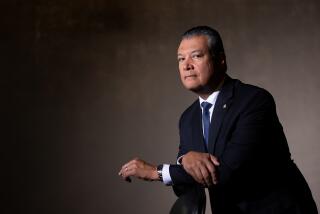Marco Rubio angling for higher office?
For a man who says he’s not angling to be a vice presidential candidate, Florida Sen. Marco Rubio is sure acting like a politician aiming for higher office.
The freshman Republican is set to deliver a policy speech on Tuesday at the Ronald Reagan Presidential Library, the second in a series of three major speeches on the senator’s calendar. After keeping a relatively low profile for his first seven months in office, the schedule looks very much like a carefully planned debut on a national political stage.
For the GOP, it’s a much anticipated rollout. Rubio, the son of Cuban immigrants and a darling of die-hard conservatives, has been labeled by many as a face of the party’s future and potential vice presidential pick next year.
Rubio dismisses such talk, saying he’s flattered but not interested.
“I’m not going to be asked and I wouldn’t be accepting it anyway. I really want to spend some time and do some work here in the Senate,” he said in a recent interview. “The minute you start thinking about what else might be out there for you, it starts to affect the way you’re doing your job – especially when you’re new at your job.”
The former state legislator rocketed to national prominence last year after harnessing “tea party” support and pushing then-Florida Gov. Charlie Crist out of the race for the GOP nomination. But Rubio has resisted being typecast as a “tea party” Republican. He did not join the Tea Party Caucus, led by Sen. Rand Paul of Kentucky, and has not earned a reputation as a conservative rebel.
Still, Rubio says he remains focused on the issues that drove his campaign. He voted against a budget deal that averted a government shutdown in April, saying it didn’t cut spending enough. He cites budget hawks Sens. Jim DeMint and Tom Coburn as influences in the Senate.
Earlier this month, he voted against the debt limit deal that staved off a default. In remarks on the floor during that debate, Rubio blasted Democrats for not proposing their own deficit reduction plan and called out the president by reading quotes expressing opposition to raising the debt ceiling.
“This is a quote from a ‘tea party’ extremist, right? No, this is a quote from March 16, 2006, from Sen. Barack Obama of Illinois,” Rubio said.
Rubio does seem to have something in common with the president. As early political stars, both men delivered speeches that called for a new day in American politics and spotlighted their own biographies. Rubio’s maiden speech on the Senate floor, titled “The New American Century,” outlined immigrant success stories – including his parents on the list. He cast the nation on the brink of decline, blaming bad economic policies for jeopardizing America’s place in the world.
“We Americans are as great as we have ever been. But our government is broken,” he said. “And it is keeping us from doing what we have done better than any people in the history of the world: Create jobs and prosperity.”
Rubio’s speech Tuesday will focus on the role of government. The senator said he say he believes the federal government has “not the most important but an important role” in improving the economy. The government ought to invest in infrastructure “roads and bridges and human infrastructure,” scale back unreasonable regulation and reform the tax code, he said.
“You can’t have a tax system that’s complicated and burdensome and you can’t have a tax system that discourages people doing things, making things in your country,” he said.
Tax reform is expected to be part of the agenda for the so-called “super committee” charged with crafting a deficit reduction plan this fall. Rubio expressed measured optimism that the group would craft a deal that could get through Congress.
“I recognize that the same impediments that stood in the way of the Congress solving this problem are probably standing in the way of this committee solving this problem,” he said.
Next month, Rubio is scheduled to deliver a third speech, this one on foreign policy, at the Jesse Helms Center at Wingate University in North Carolina.
kathleen.hennessey@latimes.com
More to Read
Get the L.A. Times Politics newsletter
Deeply reported insights into legislation, politics and policy from Sacramento, Washington and beyond. In your inbox three times per week.
You may occasionally receive promotional content from the Los Angeles Times.











